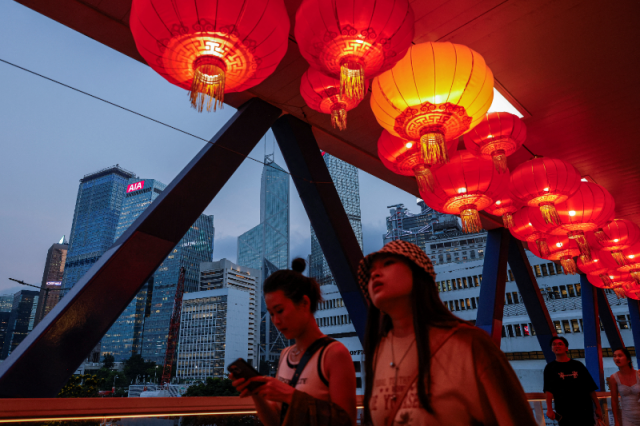
HONG KONG — Hundreds of executives, diplomats and foreign business chambers congregated at Hong Kong’s landmark M+ art museum over canapés and cocktails last month with a clear mission – reinvigorate appeal for the financial hub.
Anti-government protests in 2019, followed by Beijing’s swift imposition of a sweeping national security law in 2020 and three years of draconian COVID lockdowns prompted an exodus of tens of thousands of people from Hong Kong, taking a toll on its reputation and economy.
Sino-US tensions and China’s slowing economy have piled additional challenges on Hong Kong, hurting its traditional role as a gateway between the West and the mainland, said diplomats and business executives.
“The last few years have created a very negative image of Hong Kong,” said Inaki Amate, chairman of the European chamber in Hong Kong, one of the speakers at the M+ event.
Other speakers included government officials, European Union representatives and executives including from the city’s banks, aviation industry and its stock exchange.
The event is among many trying to rebuild ties between the West and the former British colony, with visitors mainly coming from the mainland and Asia, while visa applicants are primarily from China, said Amate.
Executives point to the changing fabric of Hong Kong with mainlanders making up more than nine-out-of-ten of all those approved to work under government talent schemes.
“If we believe that Hong Kong will be able to recover its most international Asia city status by continuing on this trend, we are very wrong,” said Amate. “Hong Kong needs diversity.”
Finance Secretary Paul Chan held a marketing blitz tour in European cities in September, while Hong Kong’s Monetary Authority is holding a high profile banking conference in November to enable people to see Hong Kong’s “vibrancy” and “show guests the best” of the city.
For many outside Hong Kong however, the perception is still very negative, said executives.
“For people who haven’t lived in Hong Kong, they see a really battered and negative image that’s been present since the protests in 2019,” said former American Chamber of Commerce President Tara Joseph.
“You’ve got what happened with the national security law, the pandemic and now you’ve got a pretty big problem with China’s economy. People have a very deeply damaged image and it’s going to take more than having a banking conference in the Four Seasons hotel to really get people to go ‘wow this is exciting.’”
Bad PR
Hong Kong’s efforts to attract high calibre talent are hindered by concerns over Beijing’s imposition of the security law, said a diplomat in the city, citing the bounty on opposition figures which have fuelled adverse publicity.
“Life is great here, particularly if you are an expatriate. It’s safe, great nature and so much going on, but the image is still very negative,” the diplomat said.
Many in the legal sector said the law has stoked concerns over judicial independence, while some executives are concerned that Hong Kong is losing relevance as some businesses relocate to Singapore and Dubai.
More than one-fifth of Hong Kong’s office tenants are likely to reduce office space in the coming two years with more than half citing shrinking business demand, according to Colliers.
A survey by recruiter Robert Walters in September said that more than half of Hong Kong professionals are considering or planning to move out of the city.
Companies such as National Bank Australia have left Hong Kong, whilst dozens of bankers and corporate lawyers have been fired due to a lack of business.
“Hong Kong is a barometer of the economic activities in China,” said Patrick Ip, managing director at China-ASEAN Investment Cooperation fund. “Because of the recent China economic downturn and regulatory policy changes in some key sectors, the capital market is suffering due to weak investment sentiment.”
Hong Kong’s IPO market has lost momentum with only around $2.7 billion raised so far this year compared with $4 billion a year earlier and at least $35 billion at the market’s peak during COVID.
Asia Pacific funds that include China are now harder to arrange due to concerns over the country’s political and economic outlook, said a senior banker.
Overall visitor levels are 70% of pre-pandemic levels, with tourism from mainland China recovering much faster than those from Europe and the US.
David Baverez, an investor in Hong Kong and author of “China & Europe: The Turning Point”, said the city will adapt and thrive, with inflows from the Middle East and the mainland replacing money from the West.
“Old Hong Kong is not back,” Baverez said. “A new Hong Kong will emerge. It will continue to thrive but only because it succeeds in reinventing itself.”
– Additional reporting by Dorothy Kam and Scott Murdoch; editing by Simon Cameron-Moore









